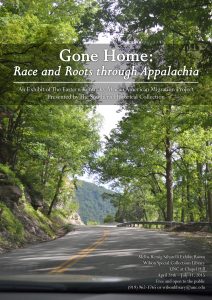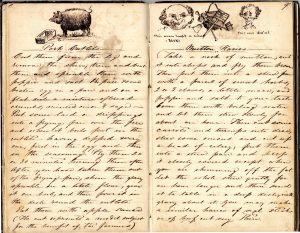An American traveler in the 1850s journeyed the globe not by plane, but by boat and train, without telephone, radio receiver, or photo identification. A 15.5-by-10.5-inch passport from 1855 reads “nose — small, chin — large, hair — gray,” among other physical descriptions. The passport belonged to William Elliott and his daughters, who traveled to Paris before photography was in common use.

That passport, along with letters, photographs, maps, diaries, account books, and menus spanning the nineteenth and early-twentieth centuries, are part of Southerners Abroad: A Look at Southerners’ Travels Around the World. The exhibit opened in Wilson Library’s Southern Historical Collection (SHC) August 8, and will run through October 15, 2008.
Drawing on the SHC’s unique holdings, Southerners Abroad explores the wide variety of Southerners’ experiences abroad, shifting the traditional focus of the SHC away from the geographical southeastern United States to the world at large.
“I personally want people to know the Southern Historical Collection has more than they would think,” said UNC junior and student assistant Kelli Landing. Landing worked on the exhibit with Barbara Ilie, research and instructional services assistant; Robin Davies Chen, assistant manuscripts reference librarian; and Matt Turi, manuscripts reference librarian.
Landing’s favorite exhibit material comes from the Turner sisters, North Carolinians who were working and studying abroad in the 1930s and 1940s – when passports did include photographs. “I love that as women they traveled by themselves. That’s unusual,” Landing said.
One of the Turner sisters’ passports is displayed in the exhibit and is a window on gender relations at a time when most travelers were men. The passport contains a space for writing one’s name, and beneath it, blank spaces following the phrases “accompanied by wife” and “minor children.” These spaces are filled with X’s, emphasizing her position as a woman traveling without male accompaniment.
Other items in the exhibit include colorful menus offering hearts of lettuce and brains “as you like them” for $1.50; hand-tinted photographs given to American missionary to Japan, John C. Calhoun Newton; and letters describing hyenas and lions on the camp of Egyptian army engineer Samuel Henry Lockett.
“Traveling back then-in the nineteenth century-there were many things to fear,” said Barbara Ilie. “I encountered someone who feared yellow fever. Others had issues with loneliness. I had someone waiting literally for the monthly mail boat. The technology difference is astounding.”
Southerners Abroad is free and open to the public. The exhibit is on view in the Southern Historical Collection on the fourth floor of Wilson Library on the campus of UNC-Chapel Hill. The Southern Historical Collection is open 9 a.m. to 6 p.m. weekdays, and 9 a.m. to 1 p.m. Saturdays. For exhibit information, contact Matt Turi, 919-962-1345.
 Over the last few years the SHC has been collaborating with Karida Brown (Ph.D. candidate at Brown University) and many Appalachian families on the Eastern Kentucky African American Migration Project (EKAAMP), which documents peoples’ lives in eastern Kentucky and their tale of migration into and out of the communities there. The wonderful stories shared by the endlessly generous people who grew up in these small towns inspired the creation of Gone Home: Race and Roots through Appalachia–an exhibit hosted in Wilson Library’s Melba Saltarelli Exhibit Room.
Over the last few years the SHC has been collaborating with Karida Brown (Ph.D. candidate at Brown University) and many Appalachian families on the Eastern Kentucky African American Migration Project (EKAAMP), which documents peoples’ lives in eastern Kentucky and their tale of migration into and out of the communities there. The wonderful stories shared by the endlessly generous people who grew up in these small towns inspired the creation of Gone Home: Race and Roots through Appalachia–an exhibit hosted in Wilson Library’s Melba Saltarelli Exhibit Room. Over the last few years the SHC has been collaborating with Karida Brown (Ph.D. candidate at Brown University) and many Appalachian families on the Eastern Kentucky African American Migration Project (EKAAMP), which documents peoples’ lives in eastern Kentucky and their tale of migration into and out of the communities there. The wonderful stories shared by the endlessly generous people who grew up in these small towns inspired the creation of Gone Home: Race and Roots through Appalachia–an exhibit hosted in Wilson Library’s Melba Saltarelli Exhibit Room.
Over the last few years the SHC has been collaborating with Karida Brown (Ph.D. candidate at Brown University) and many Appalachian families on the Eastern Kentucky African American Migration Project (EKAAMP), which documents peoples’ lives in eastern Kentucky and their tale of migration into and out of the communities there. The wonderful stories shared by the endlessly generous people who grew up in these small towns inspired the creation of Gone Home: Race and Roots through Appalachia–an exhibit hosted in Wilson Library’s Melba Saltarelli Exhibit Room.







